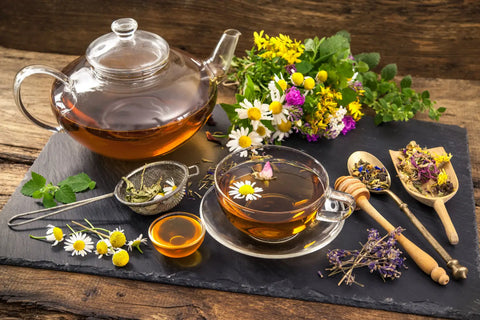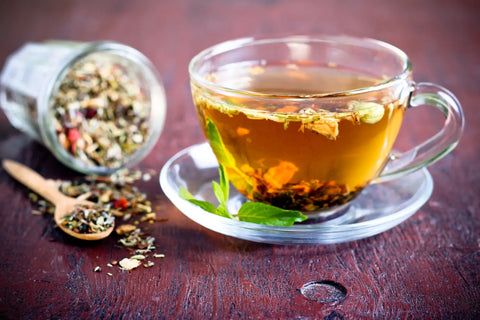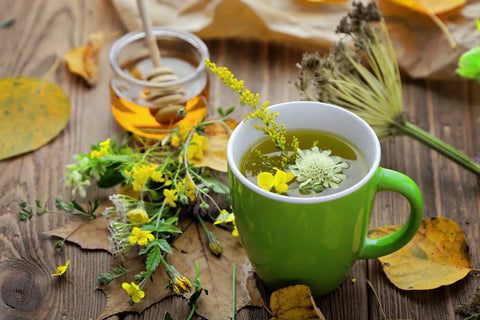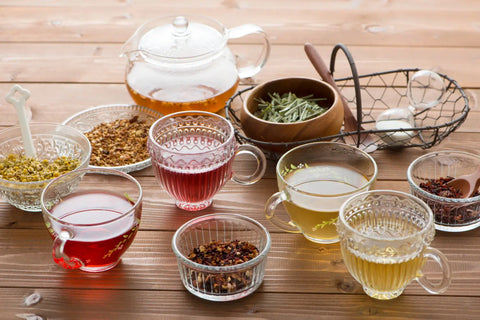Exploring the Benefits of Herbal Tea
What Are the Best Herbal Tea for Your Health?
Herbal Tea
If you're wondering what are the best herbal tea options for your health, look no further. Herbal tea has been used for centuries for its many health benefits, and with so many different varieties available, it can be hard to know where to start. In this article, we'll explore the top herbal teas and their unique benefits, so you can find the perfect cup for your health and wellness goals.
I. What are Herbal Teas?
Herbal teas are made from a combination of dried leaves, flowers, roots, and stems of various plants. Unlike traditional tea, which comes from the Camellia sinensis plant, herbal teas are made from a wide range of plants and herbs. Herbal teas are naturally caffeine-free and are often used for their medicinal properties.
II. Benefits of Drinking Herbal Tea
Herbal tea has been consumed for centuries for its medicinal properties and health benefits. With a wide variety of herbs available, it can be difficult to know what the best herbal tea options are for you. In this article, we will explore the benefits of drinking herbal tea and recommend some of the best herbal teas to try.

Benefits of Drinking Herbal Tea
Boosts Immune System
One of the greatest benefits of drinking herbal tea is that it can boost your immune system. Many herbs contain antioxidants and other compounds that can help protect your body against illnesses and diseases. Some of the best herbal teas for immune system support include echinacea, elderberry, ginger, and chamomile.
Helps with Digestion
Drinking herbal tea can also aid in digestion. Herbs such as peppermint, ginger, and fennel can help ease digestive discomfort and relieve symptoms of indigestion, bloating, and nausea.
Promotes Relaxation
Another great benefit of drinking herbal tea is its ability to promote relaxation and reduce stress levels. Chamomile, lavender, and lemon balm are all known for their calming properties and can help soothe anxiety and promote better sleep.
Lowers Inflammation
Many herbs have anti-inflammatory properties that can help reduce inflammation in the body. Turmeric, ginger, and cinnamon are all examples of herbs that can help lower inflammation and may be particularly beneficial for those with conditions such as arthritis or asthma.
Supports Heart Health
Some herbs, such as hibiscus and rooibos, can help support heart health by lowering blood pressure and cholesterol levels. These teas can also improve circulation and reduce the risk of heart disease.
Aids in Weight Loss
Certain herbs, such as green tea and dandelion, can aid in weight loss by boosting metabolism and reducing appetite. These teas can also help the body flush out toxins and excess fluids, leading to a slimmer, healthier body.
III. What Are The Best Herbal Teas To Try? Here Are Some Recommendations
When it comes to herbal tea, there are a plethora of options available to choose from. With different tastes, aromas, and health benefits, it can be overwhelming to decide which herbal tea to try first. To help you narrow down your choices, here are some of the best herbal teas to try:

Herbal Teas for Stress and Anxiety
Top 5 Herbal Teas for Overall Health
known for its calming properties, chamomile tea can help promote relaxation and improve sleep quality. It also has anti-inflammatory and antioxidant properties that can benefit the skin and digestive system.
This is a refreshing and invigorating tea that can help relieve nausea, bloating, and digestive discomfort. Peppermint tea also has antimicrobial and antiviral properties that can help support a healthy immune system.
This is a warming and spicy tea that can help alleviate nausea, inflammation, and pain. Ginger tea also has antioxidant and anti-inflammatory properties that can benefit the cardiovascular system and brain function.
This is a tart and fruity tea that can help lower blood pressure and cholesterol levels. Hibiscus tea also has anti-inflammatory and antioxidant properties that can benefit the immune system and skin health.
This is a caffeine-free tea with a slightly sweet and nutty flavor. Rooibos tea is rich in antioxidants and has anti-inflammatory properties that can help support healthy heart and brain function.
Best Herbal Teas for Stress and Anxiety
This is a soothing and relaxing tea that can help calm the mind and reduce anxiety. Lavender floral tea also has antibacterial and antiviral properties that can benefit the immune system and promote healthy skin.
This is a lemony and refreshing tea that can help reduce stress and improve sleep quality. Lemon balm tea also has antioxidant and antiviral properties that can help support a healthy immune system.
This is a sweet and floral tea that can help promote relaxation and reduce anxiety. Passionflower tea also has anti-inflammatory and antioxidant properties that can benefit the cardiovascular system and brain function.

Best Herbal Teas for Digestive Health
This is a sweet and licorice-like tea that can help relieve bloating, gas, and digestive discomfort. Fennel tea also has antimicrobial and anti-inflammatory properties that can benefit the immune system and oral health.
Dandelion tea is a bitter and earthy tea that can help improve digestion and liver function. Dandelion tea also has diuretic and anti-inflammatory properties that can benefit the cardiovascular system and skin health.
This is a warm and spicy tea that can help regulate blood sugar levels and improve digestion. Cinnamon tea also has antioxidant and anti-inflammatory properties that can benefit the immune system and brain function.
How to Brew the Perfect Cup of Herbal Tea

Brewing the perfect cup of herbal tea can be a relaxing and enjoyable experience, but it also requires some attention to detail.
Here are some steps to help you brew the perfect cup of herbal tea:
To get the most flavor and health benefits out of your herbal tea, it's important to start with fresh, high-quality herbs. Look for organic, whole-leaf herbs that have been properly stored and are free of any contaminants or pesticides.
Different herbs require different water temperatures to brew properly. Generally, delicate herbs like chamomile and lavender should be brewed with water that has been heated to just below boiling, while heartier herbs like mint and rosemary can be brewed with water that has been heated to a full boil.
The amount of herbs you use will depend on the specific herbs you're using and your personal taste preferences. As a general rule of thumb, use about one tablespoon of herbs per eight ounces of water.
Steeping time will also depend on the specific herbs you're using, but most herbal teas should be steeped for around five to seven minutes. If you steep your tea for too long, it can become bitter or overpowering.
Once your tea has steeped for the appropriate amount of time, strain out the herbs and enjoy. You can sweeten your tea with honey, agave, or another natural sweetener if desired.
By following these steps, you can ensure that you brew the perfect cup of herbal tea every time. Remember to experiment with different herbs and brewing methods to find the combinations that work best for you.
V. Conclusion
If you're looking for a natural and delicious way to support your health, herbal tea is a great choice. From chamomile to ginger, there are many different types of herbal tea to choose from, each with its own unique benefits. So why not explore the world of herbal tea and find what are the best herbal tea options for your needs? Your taste buds and your body will thank you.





Leave a comment